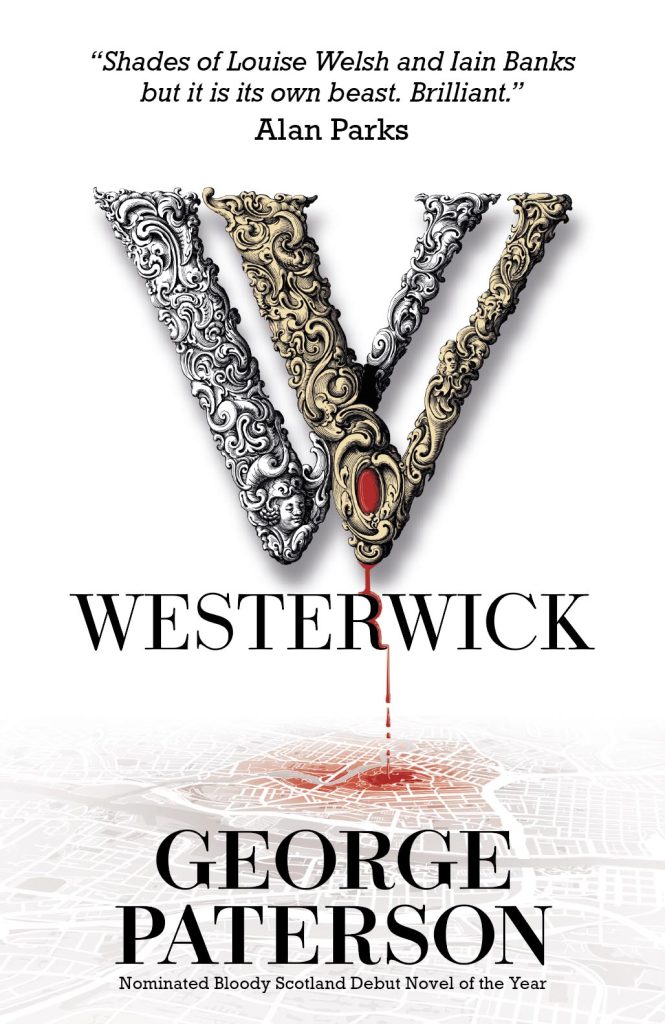Westerwick
George Paterson
(Into Books, 2023); pbk; £10.99
Westerwick is the second novel from George Paterson, whose sensational 2022 debut The Girl, The Crow, The Writer, The Fighter was always going to be a tough act to follow. Like Paterson’s first novel, Westerwick is a crime thriller, but it diverges sharply from its predecessor with a local setting and sinister tone. With a troubled protagonist and stylish dialogue, Westerwick is eerie and captivating. Instead of The Girl…The Fighter’s historical fiction, Westerwick takes place predominantly in contemporary Glasgow. The setting is at once familiar and unfamiliar. We move restlessly through the city and through time, the past encroaching on the present in flashbacks and ghost buildings.
Glasgow is haunted and secretive. Where Paterson’s first novel offered international adventure, Westerwick is claustrophobic. Even the protagonist Thomas’s flat is no sanctuary. His neighbours are nosy; his boss owns the lease; and strangers come to tidy whilst Thomas is away. The city simmers with threatened violence. The effect is oppressive and paranoia inducing:
After half a year of unremitting rain, snow and cloud, Glasgow had seemingly bypassed spring and gone for an early march on summer… a strange kind of heat madness would invariably infect and incapacitate its citizens…and the rule of law…would be gleefully obliterated like an empty tonic wine bottle
against a wall.
Then there’s Westerwick itself. Paterson’s Westerwick is a ‘fictitious’ island despite there being a Shetland settlement of the same name – more uncanny familiarity. Up until the climax, the titular island is seen only in paintings, flashbacks and bloody historical anecdotes. This permits the island to maintain an air of sinister mystery and isolation, though I admit to being surprised and somewhat disappointed that, once we reached Westerwick, we didn’t stay there longer.
Stumbling through this not-quite-real landscape, Thomas is a compelling protagonist, if not always likeable. Once a promising and ambitious young lawyer, we join Thomas struggling to piece his life back together in the wake of an accident which has left him alone, with a bad leg and an addiction to painkillers. The firm he works for takes great pains to spare him from the worst legal consequences of his own self-destructive behaviour. He lies, is petty and vindictive. He has a psychosexual obsession with several of his female co-workers, including his would-be mother-in- law. Yet there is something darkly comic in the clashing of Thomas’s outward respectability – middle-class, charming and professional – and his inner misanthropic depravity. He crashes a First Holy Communion. He pisses on the stairwell carpet and blames it on the neighbour’s dog – repeatedly. He’s not the most sympathetic protagonist, but his spiral feels intimately, frustratingly human.
Most of the characterisation of the rest of the cast comes through in dialogue. Indeed, I suspect characterful dialogue may become Paterson’s stylistic signature, if his first two books are anything to go by. Consider this exchange between Thomas and a pharmacy dispenser:
“She left him for a guy fae Arnold Clark.”
“Which Arnold Clark?”
“Springburn. The one beside the KFC.”
“Got you. Was there a reason behind the split?”
“The guy fae Arnold Clark offered her merr options, if you know what I mean,”
Stacey laughed, “but seriously, she’d lost patience with all his weirdness.”
Thomas was intrigued. “Like what?”
“Well, when you start believing your postman is a serial killer you either need
some psychiatric help or…”
“Or you need to get your mail redirected,” Thomas countered.
Stacey is a side-character, but a charming one. In this interaction, dialect shows the divide – of class, culture and location – between her and Thomas, but there is an easy banter between them. The story has some cleverly foreshadowed twists. I confess to losing the thread of some plot points. With such an unreliable narrator – Thomas has occasional blackouts and even hallucinations – it’s possible Paterson intended to leave the reader lost, but it did mean I ended the book somewhat frustrated.
Frankly, Westerwick lacks for me the literary polish of Paterson’s first novel. It is still, however, a very engaging read, and Paterson should be praised for showing versatility.
Kai Durkin


Leave a Reply